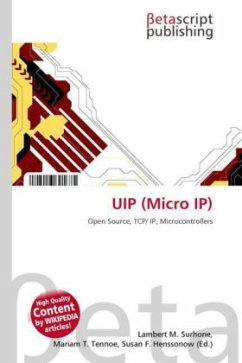
UIP (Micro IP)
Versandkostenfrei!
Versandfertig in 6-10 Tagen
19,99 €
inkl. MwSt.

PAYBACK Punkte
10 °P sammeln!
Please note that the content of this book primarily consists of articles available from Wikipedia or other free sources online. The uIP is an open source TCP/IP stack capable of being used with tiny 8 and 16 bits microcontrollers. The uIP was initially developed by Adam Dunkels of the "Networked Embedded Systems" group at the Swedish Institute of Computer Science, licensed under a BSD style license, and further developed by a wide group of developers. uIP is widely used in the embedded systems industry and has been ported to several platforms, including DSP platforms. In October 2008, Cisco, A...
Please note that the content of this book primarily consists of articles available from Wikipedia or other free sources online. The uIP is an open source TCP/IP stack capable of being used with tiny 8 and 16 bits microcontrollers. The uIP was initially developed by Adam Dunkels of the "Networked Embedded Systems" group at the Swedish Institute of Computer Science, licensed under a BSD style license, and further developed by a wide group of developers. uIP is widely used in the embedded systems industry and has been ported to several platforms, including DSP platforms. In October 2008, Cisco, Atmel, and SICS announced a fully compliant IPv6 extension to uIP, called uIPv6. Open source describes practices in production and development that promote access to the end product''s source materials. Some consider open source a philosophy, others consider it a pragmatic methodology. Before the term open source became widely adopted, developers and producers used a variety of phrases to describe the concept; open source gained hold with the rise of the Internet, and the attendant need for massive retooling of the computing source code.












